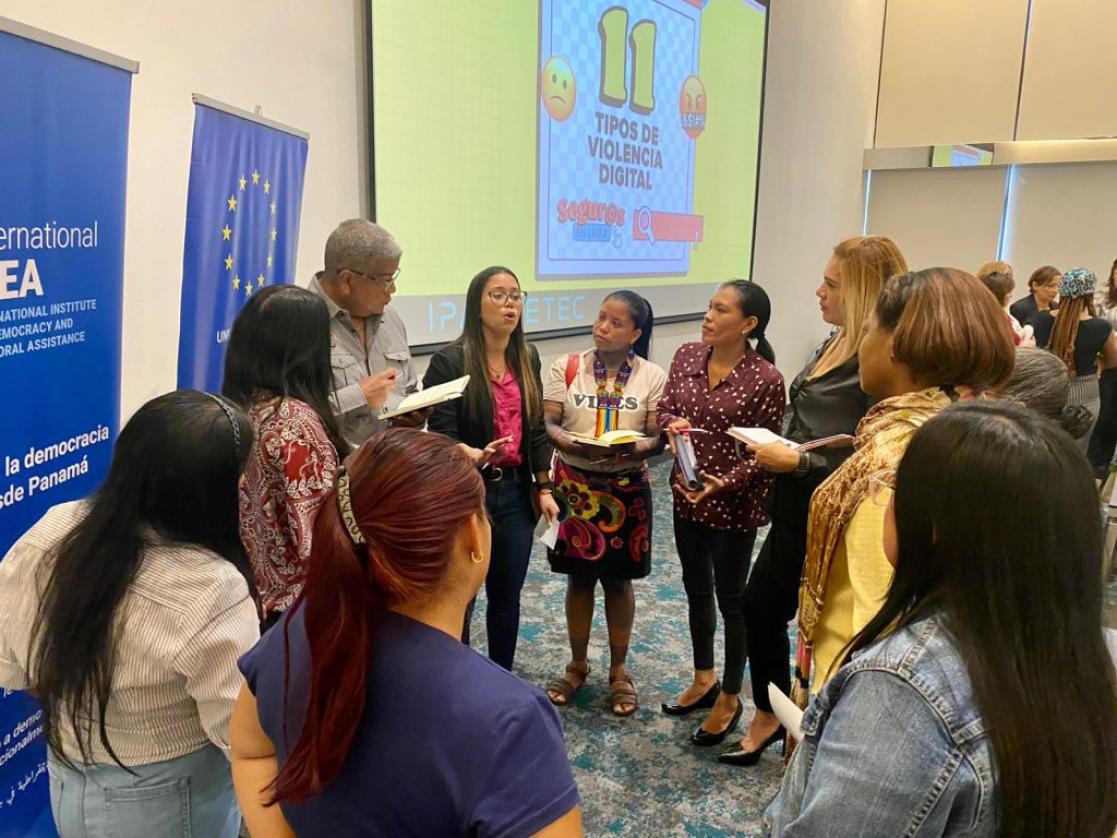Democracy, Human Rights and Civil Society
EU values and guiding principles
The European Union (EU) is guided by respect for human rights, democracy and the rule of law. These values have therefore also been established as fundamental principles of its external action. In this regard, the EU works tirelessly to strengthen democratic systems around the world, supporting the creation of resilient, inclusive and democratic societies.

Democracy
The EU Action Plan for Human Rights and Democracy 2020-2027 is one of the key tools in this process. It focuses not only on the protection of human rights, but also on empowering people and strengthening democratic institutions, promoting an environment where the fundamental values of democracy, such as freedom of expression, political plurality and citizen participation, are a reality in all nations.
In this framework, the EU supports countries in improving their democratic institutions, helping to ensure that effective accountability mechanisms are in place and that governments act in a transparent and accountable manner towards their citizens.
The Plan consists of 5 themes that bring together the different actions that are carried out:
- Protecting and Empowering People
- Building Resilient, Inclusive and Democratic Societies
- Promoting a Global Human Rights and Democracy System
- New Technologies: Seizing Opportunities and Addressing Challenges
- Achieving the Goals by Working Together

Human Rights
In the EU Action Plan for Human Rights and Democracy 2020-2027, the EU is committed to promoting equal rights for all people, regardless of gender, race, religion or sexual orientation.
A particularly relevant aspect within this Plan is the Action Plan for Gender Equality and Women's Empowerment in External Action 2021-2025 (GAP III), which places gender equality and women's empowerment at the centre of EU policies and actions. Through this approach, the EU seeks not only to secure civil and political rights, but also to improve the economic, social and cultural conditions of women worldwide.
In addition, the EU publishes the Annual Report on Human Rights and Democracy (most recent edition 2024), which assesses the fulfilment of human rights worldwide, with specific details on countries such as Panama. This report serves as a tool to analyse progress and challenges in the area of human rights in different regions.
The Delegation of the European Union and the Member States present in Panama implement the Global Action Plan through the Democracy and Human Rights Strategy for Panama 2021-2027.

Civil Society
The EU recognises that an active and engaged civil society is fundamental for the consolidation of democracy and the protection of human rights. The active participation of citizens is essential to ensure that government institutions are transparent, accountable and effective. In this context, the EU recognises the importance of strengthening civil society networks, supporting organisations and citizens' movements working for justice, transparency and democratic participation.
Panama has a Roadmap for EU Engagement with Civil Society in Panama for the period 2023-2027, which is implemented in a complementary manner to the EU Multiannual Regional Indicative Programme for Latin America and the Caribbean 2021- 2027. The Roadmap sets out priorities to foster citizen participation, transparency, accountability and effective governance. The Roadmap for Panama is divided into the following priorities:
- To develop and strengthen Team Europe's relations with Panamanian civil society.
- Strengthen the capacities of Panamanian civil society organisations.
- Promote the creation of spaces for structured participation of civil society organisations in national policies as important development actors
Electoral Expert Mission for Panama's General Elections 2024
Invited by the Electoral Tribunal of Panama, the European Union deployed an Electoral Expert Mission (EEM) to Panama from 6 April to 21 May 2024. The EEM was composed of three members: a political and electoral expert, a legal expert and a media and social media expert. The mission's mandate was to gather objective information, assess and report on the 5 May general elections, taking into account Panama's international and regional commitments and good practices for the conduct of democratic elections. This was the first electoral mission deployed by the European Union to Panama.
It resulted in a final report setting out 13 recommendations to improve the conduct of the elections in Panama and to help bring the process into full compliance with international obligations and standards for democratic elections.
The recommendations cover the legal framework, electoral system, electoral administration, registration of candidates and political parties, campaign financing, media, women's participation, political participation of persons with disabilities and electoral disputes. The report was submitted to the Electoral Tribunal and presented on several occasions, such as the IX Meeting of Political Scientists organised by the Centre for Democratic Initiatives (CIDEM).
Projects in the area of democracy, human rights and civil society
The EU not only promotes principles, but also supports concrete projects that contribute to the implementation of these values. Accordingly, the EU supports various projects that seek to strengthen democracy, human rights and citizen participation in different countries, such as Panama. A large part of EU projects in Panama seeks to support the work of civil society organisations (CSOs). Through its cooperation framework, the EU supports projects that strengthen the capacities of civil society, enabling citizens to become actively involved in decision-making processes and in the implementation of public policies. In this way, the EU contributes to building fairer, more transparent and democratic societies, where the rights of all people are respected and promoted.
INTER PARES Panama - Strengthening Democratic Legislative Competencies

IDEA Internacional
The INTER PARES Panama project, implemented by International IDEA, seeks to improve legislative competencies in Panama by supporting members of the National Assembly in understanding and applying democratic and good governance practices. Specifically, INTER PARES Panama provides training to deputies on issues related to democracy and good governance, promoting transparency and strengthening parliamentary institutions. It also promotes interaction with youth, women, minority groups and civil society to strengthen the quality of democracy by encouraging political participation in decision-making with new country commitments and citizen demands and in a context of significant distrust towards institutions, in particular the National Assembly. After 24 months of project duration, the expected outcomes are:
- Improve the knowledge of MPs on key political issues and basic parliamentary skills
- Improve the capacity of candidates, particularly women, indigenous peoples and youth, to participate in the 2024 elections.
- Strengthen the competencies of parliamentary committees such as Women, Children, Youth and Family, as well as Indigenous Affairs
- Improve the National Assembly's National Directorate for the Promotion of Citizen Participation and its outreach and transparency mechanisms.
- Improve the capacity of civil society organisations to prepare and disseminate applied and evidence-based research in a way that supports the liberation and the work of the National Assembly.
Support to the Alliance for Development in Democracy (ADD) in promoting independent and pluralistic media, access to information and the fight against disinformation

Particip
The EU, committed to access to information, the fight against disinformation and the strengthening of independent and pluralistic media, supports through this project the Alliance for Development in Democracy (ADD), composed of Panama, Costa Rica, Dominican Republic and Ecuador. The main objective of the project is to promote economic growth within the framework of democracy, human rights and the Sustainable Development Goals of the Alliance for Development in Democracy by promoting independent and pluralistic media, access to information and the fight against disinformation.
To this end, the project has a budget of €2 million and will carry out the following actions between 2024 and 2027:
- Improving legal protection frameworks and mechanisms for journalists, especially women, and independent media.
- Strengthened capacities of government agencies, civil society organisations and the media to detect and respond to disinformation campaigns.
- Strengthened relationships and collaborations between different stakeholders to maximise the sustainability impact of the outcomes.
The regional project office is located in Panama.
Altavoz Juvenil de la Unión Europea en Panamá

UE en Panamá
The Youth Sounding Board (in Spanish Altavoz Juvenil) was launched in November 2023 as part of the European Union's commitment to youth participation, a core principle in its founding values. Recognising young people as agents of change, this initiative is framed within the EU Youth Action Plan (2021), with the aim of strengthening the voice, empowerment and connection of youth for the development of more inclusive, democratic and sustainable societies.
Currently the Youth Sounding Board is composed of representatives from 11 CSOs dealing with issues such as: democracy, empowerment, feminism, ecology, indigenous peoples’ rights, prisoners’ rights, education, water and natural resources, climate change, youth.
This project pursues the following outcomes:
- Creation of a regular consultation space to strengthen mutual understanding between the EU Delegation and youth CSOs.
- Youth empowerment through the inclusion of their perspectives in EU initiatives and programmes in Panama.
- Increased recognition and support to participating organisations at national and international level.
- Establishment of links and alliances between participating CSOs, fostering dialogue, cooperation and exchange of good practices among young people in Panama, with the possibility of carrying out joint projects.
- Strengthening the role of youth as agents of change, promoting sustainable development, peace and respect for human rights.
SANCUS Panama: Evaluation of the Role of Oversight of the National Assembly

Libertad Ciudadana
The SANCUS Panama project, led by Libertad Ciudadana (the Panamanian chapter of Transparency International), assessed the capacities and performance of the National Assembly of Panama in its oversight and control function over the other branches of government.
Oversight is a fundamental aspect of democratic governance, with the potential to raise standards of transparency, accountability and effective governance. Effective oversight by supervisory institutions can positively influence the performance of government institutions and access to quality public services, and is essential to prevent abuses of power and ensure that government actions are consistent with democratic values and principles.
The project used an assessment tool with 93 indicators divided into six key areas, such as financial oversight, implementation of laws and the Assembly's relationship with other supervisory institutions. In addition, it promoted the creation of networks of citizens and civil society organisations that advocate for improved oversight systems and increased transparency in public management.
Among the organisations involved in the project are the Comptroller's Office (Contraloría), the Ombudsman's Office (Defensoría del Pueblo) and the Transparency Authority (Autoridad de Transparencia). Through workshops, events and communication campaigns, the project aims to raise public awareness of the oversight process and the opportunities for participation in these mechanisms, as well as to develop a series of recommendations or proposals for improvement.

